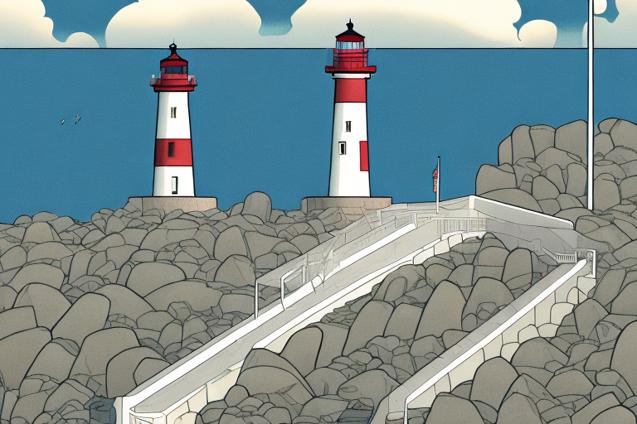
Discover the inspiring story of a disabled sailor who has overcome numerous challenges to pursue their passion for sailing, and learn about the importance of accessibility in the sailing community.
The Importance of Accessibility: Lessons from a Disabled Sailor
Sailing is an incredible way to explore the world, connect with nature, and spend quality time with family. However, for those with disabilities, the prospect of sailing can seem daunting or even impossible. In this article, we will share the inspiring story of a disabled sailor who has overcome numerous challenges to pursue their passion for sailing. We will also discuss the importance of accessibility in the sailing community and provide practical advice for those with disabilities who are considering embarking on their own sailing adventures.
A Sailor’s Story: Overcoming Obstacles and Embracing the Sea
Our story begins with John, a lifelong sailing enthusiast who was diagnosed with multiple sclerosis (MS) in his early 30s. Despite the physical limitations imposed by his condition, John was determined to continue sailing and share his love for the sport with his family.
John’s journey began with a series of adaptations to his boat, which allowed him to continue sailing despite his limited mobility. These modifications included installing handrails, widening doorways, and adding a wheelchair lift to the deck. With these changes in place, John was able to continue sailing and even participate in races with his family.
As John’s condition progressed, he faced new challenges that required further adaptations to his boat and sailing techniques. He began using a motorized wheelchair, which necessitated the installation of a joystick-controlled electric winch system for raising and lowering sails. Additionally, John worked with a team of engineers to develop a custom steering system that allowed him to control the boat’s rudder using his head movements.
Through determination, innovation, and the support of his family and the sailing community, John has continued to sail and compete in races despite the challenges posed by his disability. His story serves as a powerful reminder of the importance of accessibility in sailing and the potential for individuals with disabilities to pursue their passions.
The Importance of Accessibility in Sailing
John’s story highlights the importance of accessibility in the sailing community. By making sailing more accessible to individuals with disabilities, we can:
-
Promote inclusivity and diversity: Ensuring that sailing is accessible to all individuals, regardless of their physical abilities, promotes a more inclusive and diverse community. This enriches the sailing experience for everyone involved and fosters a greater sense of camaraderie among sailors.
-
Inspire others: Stories like John’s can serve as a powerful source of inspiration for others facing similar challenges. By demonstrating that sailing is possible for individuals with disabilities, we can encourage more people to pursue their passions and overcome obstacles.
-
Foster innovation: As demonstrated by John’s custom steering system and electric winch, the need for accessibility can drive innovation in sailing technology. This benefits not only individuals with disabilities but also the broader sailing community, as these innovations can lead to improved safety and efficiency for all sailors.
Practical Advice for Disabled Sailors
If you or a loved one has a disability and is interested in sailing, the following tips can help you get started on your journey:
-
Research accessible sailing programs: Many sailing clubs and organizations offer accessible sailing programs specifically designed for individuals with disabilities. These programs often provide specialized equipment, trained instructors, and a supportive community to help you learn the ropes and gain confidence on the water.
-
Consider boat modifications: Depending on your specific needs and the type of boat you plan to sail, you may need to make modifications to ensure accessibility and safety. This could include installing handrails, widening doorways, adding wheelchair lifts, or adapting steering and sail control systems. Consult with a marine professional or accessibility expert to determine the best modifications for your situation.
-
Connect with other disabled sailors: Building a network of fellow disabled sailors can provide valuable support, advice, and camaraderie as you navigate the challenges of sailing with a disability. Online forums, social media groups, and accessible sailing programs are all great ways to connect with others who share your passion for sailing.
-
Practice patience and perseverance: Learning to sail with a disability may require additional time, effort, and adaptation compared to able-bodied sailors. Be patient with yourself and remember that progress may be slow but steady. Celebrate your achievements, no matter how small, and keep pushing forward.
-
Prioritize safety: As with any sailor, safety should be your top priority when sailing with a disability. Ensure that you have the appropriate safety equipment on board, such as life jackets, flares, and a VHF radio. Additionally, make sure that your boat modifications are secure and well-maintained to minimize the risk of accidents.
Conclusion
The story of John, a disabled sailor who has overcome numerous challenges to pursue his passion for sailing, serves as a powerful reminder of the importance of accessibility in the sailing community. By promoting inclusivity, inspiring others, and fostering innovation, we can ensure that sailing remains a fulfilling and enjoyable pursuit for all individuals, regardless of their physical abilities.
If you or a loved one has a disability and is interested in sailing, we encourage you to research accessible sailing programs, consider boat modifications, connect with other disabled sailors, practice patience and perseverance, and prioritize safety. With determination, support, and the right resources, you too can embark on your own sailing adventure and experience the freedom and fulfillment that comes from embracing the open sea.